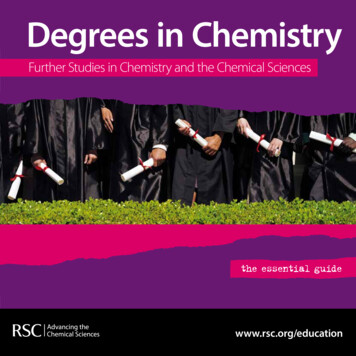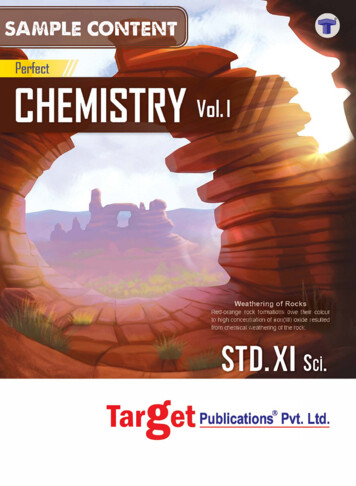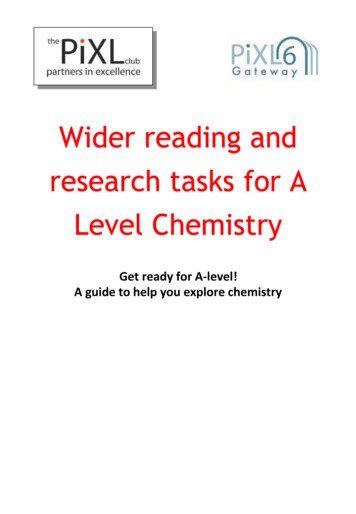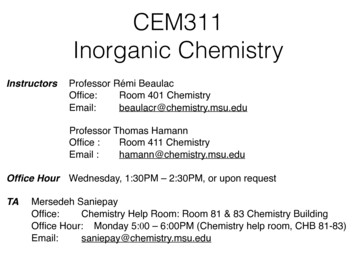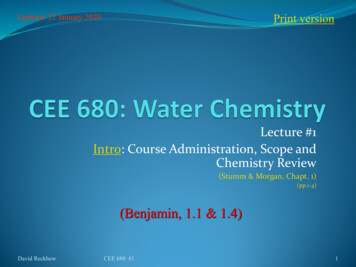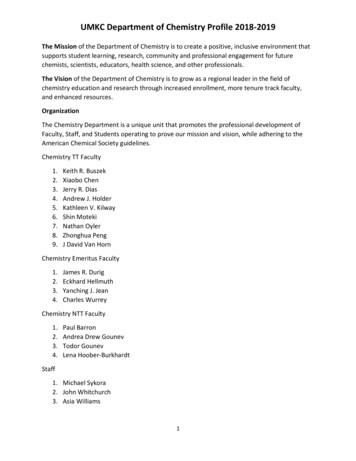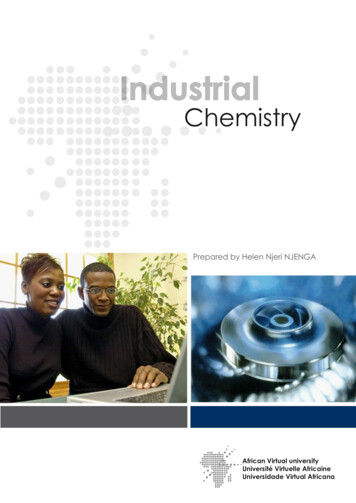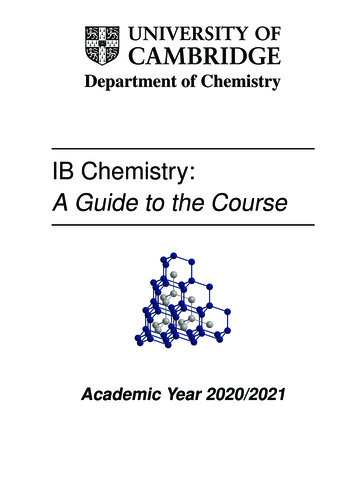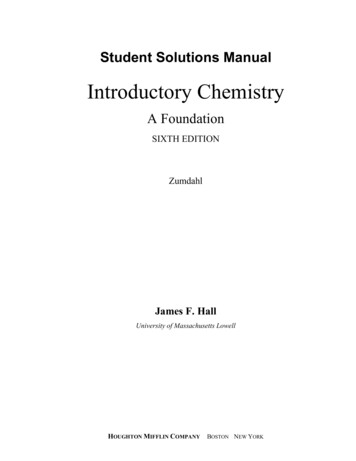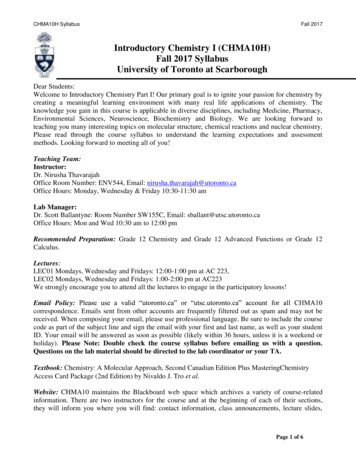
Transcription
CHMA10H SyllabusFall 2017Introductory Chemistry I (CHMA10H)Fall 2017 SyllabusUniversity of Toronto at ScarboroughDear Students:Welcome to Introductory Chemistry Part I! Our primary goal is to ignite your passion for chemistry bycreating a meaningful learning environment with many real life applications of chemistry. Theknowledge you gain in this course is applicable in diverse disciplines, including Medicine, Pharmacy,Environmental Sciences, Neuroscience, Biochemistry and Biology. We are looking forward toteaching you many interesting topics on molecular structure, chemical reactions and nuclear chemistry.Please read through the course syllabus to understand the learning expectations and assessmentmethods. Looking forward to meeting all of you!Teaching Team:Instructor:Dr. Nirusha ThavarajahOffice Room Number: ENV544, Email: nirusha.thavarajah@utoronto.caOffice Hours: Monday, Wednesday & Friday 10:30-11:30 amLab Manager:Dr. Scott Ballantyne: Room Number SW155C, Email: sballant@utsc.utoronto.caOffice Hours: Mon and Wed 10:30 am to 12:00 pmRecommended Preparation: Grade 12 Chemistry and Grade 12 Advanced Functions or Grade 12Calculus.Lectures:LEC01 Mondays, Wednesday and Fridays: 12:00-1:00 pm at AC 223,LEC02 Mondays, Wednesday and Fridays: 1:00-2:00 pm at AC223We strongly encourage you to attend all the lectures to engage in the participatory lessons!Email Policy:correspondence. Emails sent from other accounts are frequently filtered out as spam and may not bereceived. When composing your email, please use professional language. Be sure to include the coursecode as part of the subject line and sign the email with your first and last name, as well as your studentID. Your email will be answered as soon as possible (likely within 36 hours, unless it is a weekend orholiday). Please Note: Double check the course syllabus before emailing us with a question.Questions on the lab material should be directed to the lab coordinator or your TA.Textbook: Chemistry: A Molecular Approach, Second Canadian Edition Plus MasteringChemistryAccess Card Package (2nd Edition) by Nivaldo J. Tro et al.Website: CHMA10 maintains the Blackboard web space which archives a variety of course-relatedinformation. There are two instructors for the course and at the beginning of each of their sections,they will inform you where you will find: contact information, class announcements, lecture slides,Page 1 of 6
CHMA10H SyllabusFall 2017handouts, assigned readings, suggested end-of-chapter problems, and links to some useful outsideresources.Announcements: Official announcements regarding test locations, material covered for each test andother important announcements will be posted on the CHMA10H3 course web site. It is absolutelyyour responsibility to check these postings regularly for important announcements.Accessibility: Students with diverse learning styles and needs are welcome in this course. If yourequire accommodations for a disability, or have any accessibility concerns about the course, theclassroom or course materials, please contact us and or the Accessibility Services as soon as possible:SW 302, (416) 287-7560 or ability@utsc.utoronto.caActive Learning in Introductory Chemistry I:Course Surveys: There will be a pre-class and a mid-class surveys during the term to gather studentfeedback. More information on this will be announced on blackboard.Peer Facilitator Program: Facilitated Study Group (FSG) is being run through the Centre forTeaching and Learning. These weekly sessions are open to all students taking this course who want toimprove their understanding of course material, improve their study techniques, and improve theirgrade. Attendance is voluntary. In these sessions you will compare notes, discuss important concepts,develop study strategies, and prepare for exams and assignments on course material. Course material isNOT ren the course. Asurvey will be taken during the first week of class to determine the best days and times for moststudents, and they will begin probably the 2nd or 3rd week of class.Lecture Topics: Below is a brief list of topics that will be covered in this course, along with thecorresponding chapters. A more detailed list, with the associated textbook readings and assigned endof-chapter problems will be posted on portal under course materials.Chemical Reactions and Stoichiometry (Chapter 4)Gases (Chapter 5)Thermochemistry (Chapter 6)Liquids, Solids and Intermolecular forces (Chapter 11)Solutions (Chapter 12)The Quantum-Mechanical Model of the Atom (Chapter 7)Periodic Properties of the Elements (Chapter 8)Chemical Bonding I: Lewis Theory (Chapters 9)Chemical Bonding II: (Molecular Shapes, Valence Bond Theory and Molecular Orbital Theory(Chapter 10)Radioactivity and Nuclear Chemistry (Chapter 19)Parts of Chapters 21-22, & 26 (If time permits, optional)Page 2 of 6
CHMA10H SyllabusFall 2017Assessment and Grading Practices:Methods of EvaluationProblem Sets (more details to be provided on Course web space on Blackboard)Contribution to theFinal Grade5%Laboratory* (Must pass the lab component to pass the course)25%Mid-Term Test (*No-Make Up)*If you miss a test with a legitimate reason supported by acceptabledocumentation, its value will be added to that of the final.25%Final Exam45%TOTAL100%Note: To pass the course, you MUST pass the laboratory and either the term test or the finalexam (and receive a final grade of 50 , of course!).Term Test – 25% of final grade: There will be a 100-minute term test around the middle to end ofOctober which will count as 25% of your final grade. This test will be written outside of class time.The exact date, time and location will be announced as soon as this information is made available fromthe registrar.Policy on Missed Tests: This course will not have any make-up tests. Should you miss the term testdue to a legitimate reason, you must submit appropriate documentation within one week of yourabsence. If the reason is medical, an official UTSC medical form should be downloaded fromhttp://www.utsc.utoronto.ca/ registrar/resources/pdf general/UTSCmedicalcertificate.pdfandcompleted by your doctor. If no acceptable documentation is received, you will receive a grade ofzero for that test.With a validated absence, the value of the missed test will be added to your final exam. Please notethat in UTSC Calendar it states: "You cannot petition to withdraw from a course on the grounds that nowork was returned to you before the last day to withdraw without academic penalty if this is the resultof your having been given an extension to complete your work for reasons relating to you and not therest of your class."Final Examination – 45% of final grade: There will be a 3-hour, cumulative exam written during theend of semester exam period. The exact date, time and location will be announced as soon as they areavailable. Please note that if you miss the Final Exam, you must petition the Registrar's Office towrite a make-up exam in the next formal exam period. Check the UTSC Calendar for instructions anddeadlines.Online Grades: Individual grades will be posted on the Blackboard as they become available. Pleasecheck these periodically to make sure that the posted grades match your own records. Any discrepancyshould be reported immediately to the instructor or the lab coordinator, as appropriate.Page 3 of 6
CHMA10H SyllabusFall 2017Labs: The laboratory component of CHMA10 is compulsory. In order to pass the course, youMUST also pass the lab component.Lab Schedule:Laboratory periods are three hours in length and run every other week. O(Week 1 students) have their first during week of September 11thstudents) will have their first lab the week of September 18th.Lab Manual and Notebook: A lab manual must be purchased from the UTSC Bookstore before yourfirst lab. You may not use a lab manual from a previous semester: the experiments and courserequirements will be different.DO NOT wait to purchase your lab manual as it contains a host of important information:Lab Schedules and other important datesLate and absence policiesRules regarding safetyAppropriate attire for the labsGuidelines on how to properly prepare for the labThe bookstore DOES NOT stock enough lab manuals for everyone. If they run out, you MUSTpreorder a copy through the bookstore this takes time. Failure to adhere to the rules and policiesoutlined within the lab manual will adversely affect your lab mark in some instances the impact willbe severe. In addition, students will be required to purchase their own lab notebook. The book must behardtheir books at a merchant of their choice (so long as they meet the above requirements).Lab Safety: Safety in the laboratory is an extremely important element in the chemistry program atthis University. Failure to follow safe practices can cause laboratory accidents which may result in theloss of time, damage to clothing and other property, and most importantly personal injury. Byfollowing suitable precautions, you can anticipate and prevent situations that would otherwise lead toaccidents. Students registered in CHMA10H3F will be automatically enrolled in the WHMIS 2015Training course for the Fall 2017 semesterOnce the course is made available an email announcement will be made and a link to the course willAs part of this course, studentswill be expected to watch a couple of videos (approximately 90 minutes long in total) and take amultiple choice quiz on the material you just learned. Students must obtain 80% on the quiz to pass theWHMIS course. In addition, students will be required to print off your quiz results and presentthem to your TA before you will be allowed to enter the lab.Safety Equipment: Students will be required to purchase approved indirect vented chemical splashsafety goggles, and a lab coat before attending their first lab. These items can be purchased from boththe Environmental and Physical Sciences Student Association (EPSA) and the Biology StudentAssociation (BioSA) or through the bookstore. All safety eyewear must meet either ANSI Z87 orCSA Z94.3 Standard for high impact protection (if you see one of those standards stamped on youreyewear somewhere then they meet that particular standard). As part of your ancillary fees, allCHMA10H3F students will be provided a pair safety glasses at their first lab session which can bePage 4 of 6
CHMA10H SyllabusFall 2017worn during your quizzes and pre-lab discussion; however when the experiment begins, students willbe required to wear their indirect vented chemical splash goggles.Labs coats must be 100% cotton – no exceptions.Further information regarding appropriate attire please see the guidelines outlined in your lab manual.Note that students not wearing approved safety gear will not be allowed to participate in the lab.Ancillary Fees: Students taking CHMA10 will be assessed a 20.00 ancillary fee which will cover thecost of chemicals, filter paper, Pasteur pipettes and other items consumed over the course of the lab.For more information regarding ancillary fees students are encouraged to visit the following uition/Ancillary Fees.htmAids Allowed in Lab quizzes & Tests, Midterm Test and Final Exams:Please note** that only non-programmable, non-communicating calculators are allowed in tests andexams for this course (both lecture and lab). Invigilators have the authority to check calculators duringthe tests and exams. Students who have illegal calculators confiscated during a test/exam will besupplied with an allowed calculator but an immediate penalty of 10% will be imposed for thattest/exam. Students without a calculator will also be allowed to borrow an allowed model, but at thecost 10% off their mark on that test/exam.Academic Integrity: Academic integrity is one of the cornerstones of the University of Toronto. It iscritically important both to maintain our community which honours the values of honesty, trust,respect, fairness and responsibility and to protect you, the students within this community, and thevalue of the degree towards which you are all working so diligently. Detailed information about how toact with academic integrity, the Code of Behaviour on Academic Matters, and the processes by tudentsAccording to Section B of the University of Toronto's Code of Behaviour on Academic icies/behaveac.htm which all students are expected toknow and respect, it is an offence for students to:To use someone else's ideas or words in their own work without acknowledging that thoseideas/words are not their own with a citation and quotation marks, i.e. to commit plagiarism.To include false, misleading or concocted citations in their work.To obtain unauthorized assistance on any assignment.To provide unauthorized assistance to another student. This includes showing another studentcompleted work.To submit their own work for credit in more than one course without the permission of theinstructor.To falsify or alter any documentation required by the University. This includes, but is not limitedto, doctor's notes.To use or possess an unauthorized aid in any test or exam.Page 5 of 6
CHMA10H SyllabusFall 2017There are other offences covered under the Code, but these are by far the most common. Please respectthese rules and the values which they protect. Offences against academic integrity will be dealt withaccording to the procedures outlined in the Code of Behaviour on Academic Matters.Page 6 of 6
classroom or course materials, please contact us and or the Accessibility Services as soon as possible: SW 302, (416) 287-7560 or ability@utsc.utoronto.ca Active Learning in Introductory Chemistry I: Course Surveys: There will be a pre-class and a mid-class surveys during the term to gather student feedback.
